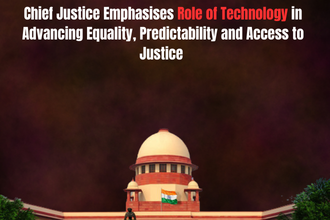In a significant development that could reshape the legal landscape surrounding reproductive rights in India, the Supreme Court has agreed to examine the constitutional validity of Section 2(1)(s) of the Surrogacy (Regulation) Act, 2021. This provision currently bars divorced and single men from availing surrogacy services, allowing only married couples and certain categories of women to access the same.
The matter was heard by a bench comprising Justice BV Nagarathna and Justice KV Viswanathan, which issued notice on a writ petition filed by a 45-year-old divorced man challenging the exclusionary provision. The case, titled Dr. Maheshwara M.V versus Union of India, will now be taken up for detailed hearing in July 2025.
Challenge To Section 2(1)(s) Of The Surrogacy Act, 2021
The petitioner has assailed the constitutionality of Section 2(1)(s) of the Surrogacy (Regulation) Act, 2021, which defines ‘intending couple’ and restricts access to surrogacy to only married couples and certain women (widows or divorced women aged 35-45 years). He argues that this gender-specific exclusion violates his fundamental rights guaranteed under Articles 14 (equality before law), 15 (prohibition of discrimination), and 21 (right to life and personal liberty) of the Constitution.
The plea emphasizes that while divorced women are permitted to opt for surrogacy within a prescribed age bracket, divorced or single men are arbitrarily excluded without any rational basis. This discriminatory classification, the petitioner contends, is manifestly arbitrary and fails to meet the twin tests of Article 14, namely intelligible differentia and rational nexus to the object sought to be achieved.
Violation Of Fundamental Rights
1. Article 14 – Right To Equality:
The petitioner argues that parenthood is a fundamental right rooted in the principles of equality, dignity, and autonomy. By permitting only certain categories of women to access surrogacy while denying the same right to divorced or single men, the impugned provision creates an unreasonable classification based on gender and marital status, thereby violating Article 14. Relying on the precedent set in Shayara Bano v. Union of India, the petitioner asserts that the provision suffers from manifest arbitrariness.
2. Article 15 – Prohibition of Discrimination:
The plea submits that the preferential treatment extended exclusively to married couples under both the Surrogacy (Regulation) Act, 2021, and the Assisted Reproductive Technology (Regulation) Act, 2021, amounts to discrimination solely on the basis of gender and marital status. Such discrimination, the petitioner contends, directly contravenes Article 15(1) of the Constitution.
3. Article 21 – Right to Reproductive Autonomy:
Highlighting the constitutional right to reproductive autonomy recognized in K.S. Puttaswamy v. Union of India and Suchita Srivastava v. Chandigarh Administration, the petitioner asserts that the impugned provision infringes his right to make intimate personal decisions relating to parenthood and family life, thereby violating his right to privacy and dignity.
Regressive And Patriarchal Assumptions
The petitioner criticizes the gendered approach adopted by the Surrogacy Act, stating that it deepens patriarchal assumptions that only women are capable primary caregivers. The plea emphasizes that such stereotypes are outdated and not supported by any scientific or logical reasoning. In fact, other legislations such as the Juvenile Justice (Care and Protection of Children) Act, 2015, and the Hindu Adoption and Maintenance Act, 1956, already allow single men to adopt children, recognizing that parenthood is not contingent upon marital status.
By contrast, the exclusion of single or divorced men from accessing surrogacy reflects an unjustifiable double standard that undermines principles of gender neutrality and substantive equality.
Transformative Constitutionalism
Relying heavily on the doctrine of transformative constitutionalism, the petitioner urges the Court to interpret the Surrogacy Act in a manner that promotes equality, liberty, and dignity, consistent with the evolving needs of society. Referring to landmark decisions such as Navtej Singh Johar v. Union of India (decriminalizing homosexuality) and Joseph Shine v. Union of India (decriminalizing adultery), the plea highlights the judiciary’s commitment to dismantling archaic gender roles and promoting progressive constitutional values.
The petition stresses that the Constitution must transform societal norms, not merely mirror outdated prejudices, and therefore calls for a liberal and purposive interpretation of the Surrogacy Act.
International Conventions And Reproductive Rights
The petitioner further relies on international human rights instruments, including:
- Article 16 of the Universal Declaration of Human Rights (UDHR): Recognizes the right of individuals to found a family without discrimination.
- Article 23 of the International Covenant on Civil and Political Rights (ICCPR): Affirms the right to family life.
- Convention on the Elimination of All Forms of Discrimination Against Women (CEDAW): Emphasizes reproductive rights but does not advocate for their denial to men.
Thus, denying single and divorced men the right to surrogacy not only violates domestic constitutional guarantees but also runs contrary to India’s international human rights obligations.
Reliefs Sought By The Petitioner
The petitioner seeks the following directions from the Supreme Court:
- Declaration that the exclusion of single/divorced men from surrogacy under the Surrogacy (Regulation) Act, 2021, is unconstitutional for violating Articles 14 and 21.
- Striking down or reading down Section 2(1)(s) of the Surrogacy Act to include divorced men within its scope.
- Awarding costs of the petition.
- Passing such further orders as may be deemed just, fit, and proper in the interest of justice.
What Lies Ahead?
The Supreme Court’s decision in this matter could have far-reaching implications on the evolving jurisprudence around reproductive rights, gender equality, and constitutional interpretation. If the exclusion is struck down, it would mark a major step forward in affirming that parenthood is a fundamental right accessible to all individuals, irrespective of gender or marital status.
As society moves towards recognizing diverse family structures, the law must keep pace with these changes. The upcoming hearing in July 2025 will thus be crucial not only for the petitioner but also for shaping India’s progressive legal framework for reproductive justice.


